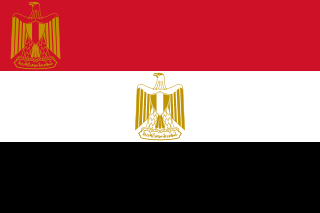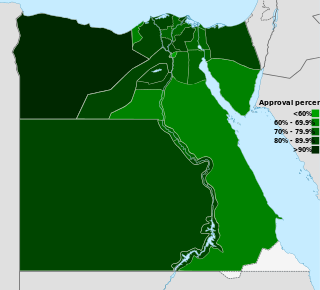
The President of the Arab Republic of Egypt is the head of state of Egypt. Under the various iterations of the Constitution of Egypt, the president is also the Supreme Commander of the Armed Forces and head of the executive branch of the Egyptian government. The current president is Abdel Fattah el-Sisi, in office since 8 June 2014.

Elections in Egypt are held for the President and a unicameral legislature. The President of Egypt is elected for a four-year term by popular vote.

Kefaya is the unofficial moniker of the Egyptian Movement for Change, a grassroots coalition which prior to the 2011 revolution drew its support from across Egypt's political spectrum. It was a platform for protest against Hosni Mubarak's presidency and the possibility he might seek to transfer power directly to his son Gamal; political corruption and stagnation; "the blurring of the lines between power and wealth; and the regime's cruelty, coercion and disregard for human rights."

The Egyptian presidential election of 2005, held on September 7, 2005, was the first allegedly contested presidential election in Egypt's history. Hosni Mubarak, the former President of Egypt, won a fifth consecutive six-year term in office, with official results showing he won 88.6% of the vote. Mubarak's opponent, Ayman Nour, of the Tomorrow Party, is estimated to have received 7.3% of the vote and Numan Gumaa received 2.8%, however, Nour claimed that prior polling results showed over 30%. Criticism of the election process has centred on the process of selecting the eligible candidates, and on alleged election-law violations during voting. Mubarak was sworn in for his new term on September 27.

The Constitution of the Arab Republic of Egypt was the former constitution of Egypt. It was adopted on 11 September 1971 through a public referendum. It was later amended in 1980, 2005, and 2007. It was proclaimed to update the democratic representative system in assertion of the rule of law, independence of the judiciary, and party plurality. On 13 February 2011, the Constitution was suspended following the resignation of President Hosni Mubarak as a result of the 2011 Egyptian Revolution. On 30 March 2011, it was officially voided after a new provisional constitution was passed by the country's ruling Supreme Council of the Armed Forces.

The 2005 Djiboutian presidential election took place on the 8 April 2005. The incumbent President of Djibouti, Ismail Omar Guelleh, was re-elected to a second six-year term in an unopposed election.

A constitutional referendum was held in Armenia on 27 November 2005. The referendum was on a series of changes to the constitution of Armenia which were backed by the international community. The official results had a high turnout and overwhelming support for the changes. However the opposition and election monitors said that there were serious irregularities with the referendum.

A presidential election was held in Egypt in two rounds, the first on 23 and 24 May 2012 and the second on 16 and 17 June. The Muslim Brotherhood declared early 18 June 2012, that its candidate, Mohamed Morsi, won Egypt's presidential election, which would be the first victory of an Islamist as head of state in the Arab world. It was the second presidential election in Egypt's history with more than one candidate, following the 2005 election, and the first presidential election after the 2011 Egyptian revolution which ousted president Hosni Mubarak, during the Arab Spring. Morsi, however, lasted little over a year before he was ousted in a military coup in July 2013.

A constitutional referendum was held in Madagascar on 17 November 2010, in which voters approved a proposal for the state's fourth Constitution. The Malagasy people were asked to answer "Yes" or "No" to the proposed new constitution, which was considered to help consolidate Andry Rajoelina's grip on power. Rajoelina heads the governing Highest Transitional Authority (HAT), an interim junta established following the military-backed coup d'état against then President Marc Ravalomanana in March 2009.

A referendum to amend the Constitution of Liberia was held on 23 August 2011. Voters chose whether to ratify four amendments regarding judge tenure, elections scheduling, presidential candidate requirements and the electoral system. The National Elections Commission of Liberia (NEC) oversaw the referendum.

A parliamentary election to the People's Assembly of Egypt was held from 28 November 2011 to 11 January 2012, following the revolution that ousted President Hosni Mubarak, after which the Supreme Council of the Armed Forces (SCAF) dissolved the parliament of Egypt. However the dissolution was ruled unconstitutional and Parliament was reinstated. Originally, the elections had been scheduled to be held in September 2011, but was postponed amid concerns that established parties would gain undue advantage.

A constitutional referendum was held in Egypt on 19 March 2011, following the 2011 Egyptian revolution. More than 14 million (77%) were in favour, while around 4 million (23%) opposed the changes; 41% of 45 million eligible voters turned out to vote.
A committee formed in February 2011 by the Egyptian military following suspension of the constitution during the 2011 Egyptian revolution. The committee's purpose is to review the constitution of Egypt, to be ratified by a referendum.

Shura Council elections were held in Egypt between 29 January and 22 February 2012. The Freedom and Justice Party emerged as the largest party in the Council, winning 105 of the 180 elected seats.

A constitutional referendum was held in Syria on 26 February 2012. In response to the Syrian Civil War, President Bashar al-Assad ordered a new constitution to be drafted. The referendum was not monitored by foreign observers.
Following the 2011 Egyptian revolution, the Muslim Brotherhood in Egypt became one of the main forces contending for political power in Egypt against the Supreme Council of the Armed Forces (SCAF) and other established centers of the former Hosni Mubarak regime.

A presidential election in Egypt took place between 26 and 28 May 2014. There were only two candidates, former Egyptian defence minister Abdel Fattah el-Sisi and Egyptian Popular Current candidate Hamdeen Sabahi. According to the Egyptian government, Sisi was elected with 97% of the vote.

A constitutional referendum was held in Egypt on 14 and 15 January 2014 and with Egyptians abroad voting between 8 and 12 January. The new constitution was approved by 98.1% of voters. Turnout was 38.6%.

A constitutional referendum was held in the Republic of the Congo on 25 October 2015 regarding a proposal to change the constitution, primarily to modify the rules regarding presidential terms.

















